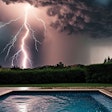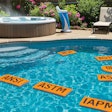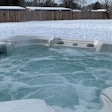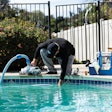
On Jan. 1, 2010, heat pump manufacturers will be required to make the move to non-ozone-depleting refrigerants, eliminating the use of R-22 refrigerants on all new heat pumps. And, while the Air-Conditioning, Heating and Refrigeration Institute Standard 1160 doesn't have an implementation date, nor does it mandate compliance, it encourages manufacturers to participate in a uniform testing standard to ensure homeowners are getting heat pumps that operate efficiently.
Standard 1160 and the replacement of R-22 play a vital role in improving the environment, an act that was once considered trendy but has become a matter-of-fact way of life.
A Global Crisis
When the Montreal Protocol was signed into effect in 1987, so began an international treaty to phase out ozone-depleting chlorofluorocarbons (CFC) in an effort to prevent further damage to the ozone layer. An amendment was made to the treaty in 1992, adding hydrochlorofluorocarbons (HCFC) to the worldwide phase out. While HCFCs are less damaging to the ozone layer than CFCs, they still contain ozone-depleting chlorine.
The HCFC R-22 has been the refrigerant used in pool heat pumps on the market. However, according to the Environmental Protection Agency, the release of R-22 into the atmosphere, due to leaks, contributes to ozone depletion, and because it's a greenhouse gas, it is also a significant contributor to global warming.
Under the terms of the Montreal Protocol, the United States has agreed to meet a Jan. 1 deadline to phase out the use of R-22 in any new heat pumps. While some heat pump manufacturers have already been using a popular replacement, R-410A, others are making the change to become compliant.
Even though R-410A is relatively new to the swimming pool industry, it's not new to the refrigeration industry.
"R-410A has been around for many years," says Bruce Aubrey, heater product manager for Hayward Pool Products, Elizabeth, N.J. "It's been thoroughly tested by many original manufacturers. So from a service perspective, from an availability perspective, R-410A is out there. It's reliable, tried and true."
So what does this mean for existing heat pumps, as well as new heat pumps?
According to Aubrey, heat pumps requiring R-22 refrigerant can still be sold, as long as they are manufactured before 2010. However, come the Jan. 1 deadline, R-22 will only be available to service existing equipment and will not be used in any new pumps. By Jan. 1, 2020, chemical manufacturers must cease production of R-22, leaving any kind of unit that requires the refrigerant to use recovered and recycled R-22 instead.
Many manufacturers have already made the change to the R-410A alternative, promoting the pumps as using EPA-recognized R-410A, an environmentally safe and non-ozone-depleting refrigerant.
"The benefit of the R-410A, aside from not depleting the ozone, is that it's slightly more efficient in the refrigeration system. There have been improvements from 5 percent to 8 percent," says Aubrey.
Jeff Tawney, vice president of AquaCal in St. Petersburg, Fla., notes that while R-410A may be the most popular choice, it's not the only one.
"R-410A is the most common choice, but there are other alternatives out there that some manufacturers are looking at and may choose to utilize. A refrigerant with no chlorine molecules in it is what's mandatory."
Demand Only The Best
When the time comes to select a heat pump for a homeowner, paying attention to the type of refrigerant used isn't the only thing you should be aware of. Manufacturers in the heat pump category have teamed up with the AHRI to establish a standard performance rating of pool heat pumps.
"Where we are at right now is an effort that's been ongoing for 15 years to organize the industry in such a way where the consumer, or end user, has some tool to determine the quality or actual performance of the heat pump pool heaters they are interested in purchasing," says Tawney.
"What we have tried to do is establish a method of testing and promoting the test results that establish the actual performance, both in capacity and efficiency, for heat pumps."
Nearly two years ago, Florida passed a building code requirement that put a minimum efficiency, or COP (coefficient of performance) on heat pumps. The code required a 4.0 COP at a low-temperature condition. Florida's heat pump standard inspired manufacturers to institute an industry-wide standard with test results backed by uniform testing protocols.
"Since Florida enacted the law to increase the minimum efficiency to 4.0 COP, the heat pump manufacturers are trying, as a group, to get all states to adopt the same standard," says John Vasarhelyi, Pentair Water Pool and Spa's heat pumps product manager.
The joint effort has resulted in the AHRI Standard 1160-2008. The purpose of the standard is to establish definitions, classifications, test requirements, rating requirements, minimum data requirements for published ratings, operating requirements, marking and nameplate data, and conformance conditions for pool heat pumps.
"Under the AHRI, eight of the 12 manufacturers have gotten back together and said we want to level the playing field," says Tawney. "We want to be able to tell a customer that if we tell you our heat pump is 100,000 Btu with a 5.2 COP, that the customer can be assured that is truly what the performance of the product is."
While conforming to the standard is voluntary, the group is working to get all heat pump manufacturers to comply.
"Most appliances are regulated by the Department of Energy," says Aubrey. "If you buy an air conditioner for your home, it's got a Federal Trade Commission yellow label on it that says it's been tested and is in compliance with a certain standard. That's what we are really doing, but we're going at it without government involvement."
The Nuts And Bolts
At this stage, consumers should look to see if their heat pumps are AHRI Performance Certified. Tawney stresses that any manufacturer can test its heat pump to the standard, but unless it's located on the AHRI directory, found at www.ahridirectory.org, it has not been tested under the certification program.
"Anybody can test the unit to the AHRI 1160 Standard," says Tawney. "However, under the certification program, the manufacturer does not get to supply what some might call the 'golden sample,' one they've made sure is perfect.
"The certified program operates on a random product selection basis where the testing lab, which is an independent third-party organization, will go into the marketplace and obtain a sample of your product, test it and then that becomes the basis for the performance results that are published."
According to Tawney, as part of the certification program the unit is tested as received from the neutral site, and if a manufacturer does not agree with the initial result, they are allowed to challenge it once. However, if the second test fails, those are the results that will be published in the directory.
"Part of being a manufacturer is not just doing the design and being able to come up with a unit that performs well, it's also coming up with quality-control standards," says Tawney. "So when you produce literally thousands of these units, each one performs the same way."
The directory serves as a real-time, online database for every unit tested by participating manufacturers. It allows retailers and homeowners to make fair and accurate comparisons of the heat pumps available on the market.
"From the consumer point of view, and even from the builder's point of view, if he goes out and buys a 115,000-Btu heat pump, he knows he's getting a 115,000-Btu heat pump if he buys one from the manufacturers who are participating in the AHRI Directory," says Aubrey. "If he goes and buys from somebody outside that directory, he's taking a risk."
Getting The Word Out
One thing that always proves to be a struggle when introducing new information in the industry is getting the word out.
"What I'm seeing as a general rule is that the industry is pretty poor on proactively getting information," says Jeff Farlow, program manager for energy initiatives at Pentair Water Pool and Spa. "I think a lot of [changes like this] would happen without anyone knowing about it, and the industry ends up getting blindsided.
Once builders, retailers and service professionals get a hold of the information, they become hungry for more, notes Farlow.
"Virginia Graeme Baker is an example. That's new legislation that impacts the industry. And if you go anywhere that offers a VGB class, that class is full."
Even though the AHRI Standard 1160 has yet to be mandated by the government, manufacturers are hopeful that the day will come and when it does, that they'll be ready.
"I would imagine that the government will eventually include heat pumps in some of their standards," says Aubrey. "What we are looking at is if we do it as an industry on our own, when the government does get involoved, they can probably just align with what we are already doing rather than setting standards or goals that can be unrealistic."
Tawney says the AHRI does have representatives working at the state and federal levels trying to get standards implemented into law so there can be a uniform requirement throughout the United States.
"Florida has adopted a minimum efficiency for heat pumps, and California has, as well," he says. "And they're different, which is kind of the frustrating part of doing it state by state. That's why we're working at these levels so we don't have varied requirements state by state."
Energy standards continue to be a hot topic in the industry. But while pool pump efficiencies have been the main focus, heat pump efficiency is gaining momentum.
"Our biggest pressing issue is to make the industry aware when there are standards out there," says Tawney. "It doesn't do any good to have a minimum if there isn't some kind of test and certification program to enforce compliance. We have the process set. We just want to make sure everyone operates on the same page."











































